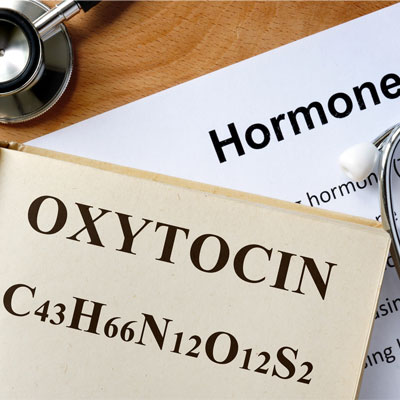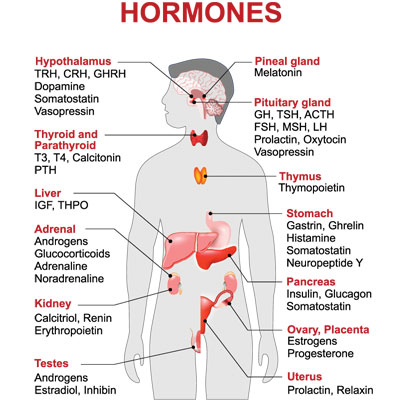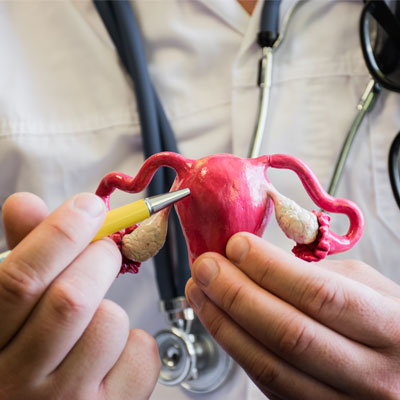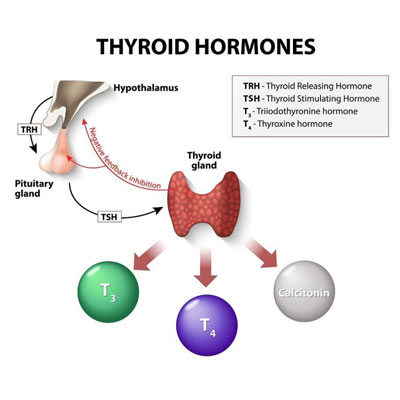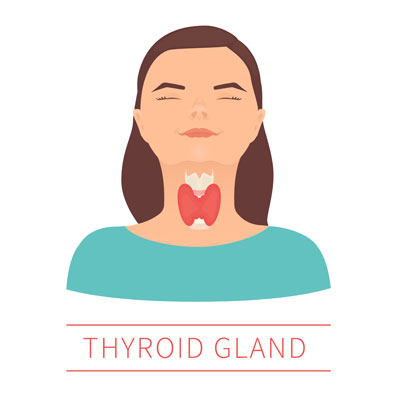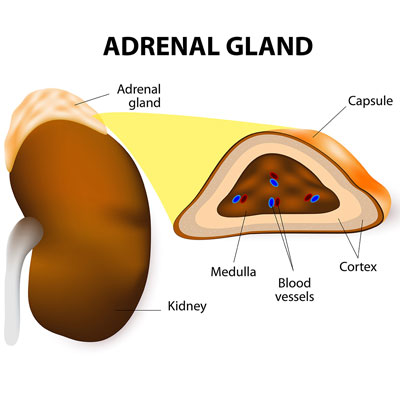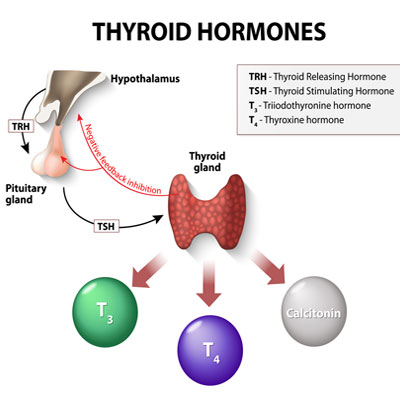Contents
- The Glands of the Endocrine System and Their Hormones
- Chart of Endocrine Hormones
- Maintaining Endocrine Hormone Functions
- Difference between Endocrine, Artificial, and Bioidentical Hormones
- Effects of Endocrine Hormones on the Brain
- Endocrine Hormones and Disease
- Endocrine Hormone Imbalance – What You Need to Know
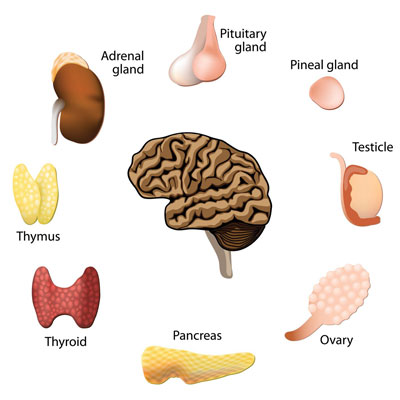
The endocrine system encompasses a vast network of glands that regulate internal processes through the secretion of chemical messengers called hormones. These hormones help regulate the many functions that other bodily systems carry out. Metabolism, digestion, respiration, cellular regeneration, movement, and immune support are just some of the areas impacted by endocrine hormones.
The relationship between endocrine system and hormones is a critical one. Some hormones have inhibiting functions that can decrease the secretion of other chemicals. Others promote their production and release through essential chemical signals. Too much or not enough of any one hormone can begin a chain reaction leading to further imbalances.
The endocrine system is a vast network of glands and organs that secrete critical hormones necessary to proper bodily functions
and health.
The Glands of the Endocrine System and Their Hormones
The Trusted sourceEndocrine System: Facts, Functions and DiseasesLive ScienceGo to sourceendocrine system and hormones associated with it stem from many parts of the body. The brain contains the hypothalamus, pituitary, and pineal glands. In the neck and chest area are the parathyroid glands, thyroid gland, and thymus. The central part of the body houses the pancreas, adrenal glands, kidneys, ovaries, and testes.
Here are the glands and organs of the endocrine system and hormones relationship to one another:
Hypothalamus– its hormones stimulate pituitary hormone production and regulate blood pressure levels. The hypothalamus measures various blood hormone levels to know which hormones to secrete.
Pituitary gland – the body’s “master gland” because of the vital hormones it secretes. Pituitary hormones are crucial for metabolism, growth, reproduction, cell regeneration, and more.
Pineal gland – the melatonin secreted by the pineal gland helps you sleep – which is when critical hormones are produced and utilized by the body.
Parathyroid glands – these four small glands behind the thyroid help control calcium levels.
Thyroid – the upper part of the trachea houses a butterfly-shaped gland that provides hormones that control metabolism, growth, and even calcium levels.
Thymus– this gland situated between the lungs and behind the breastbone functions in three systems: endocrine, immune, and lymphatic. Crucial T cells (infection-fighting white blood cells) come from the thymus. The thymus is only active through childhood and puberty, and then becomes fat later in adulthood.
Pancreas – an organ rather than a gland, the pancreas located under the stomach and between the liver and spleen is crucial for the enzymes that digest food. Pancreatic hormones control blood sugar levels and aid digestion. Cells in the pancreas that produce hormones are called islets.
Adrenal glands – the two adrenal glands are found one on top of each kidney. Hormone produced here aid blood pressure, metabolism, heart rate, and salt and water balance. The adrenals also produce a small amount of some steroid hormones.
Kidneys – produces hormones that aid blood pressure and red blood cell production.
Ovaries – also part of the reproductive system, the ovaries produce vital reproductive hormones that aid many health functions.
Testes – the producer of male sex hormones and sperm.
The skin, liver, small intestines, stomach, and placenta also play a part in endocrine hormone production.
Chart of Endocrine Hormones
In the following chart of endocrine system and hormones produced there, we feature these essential chemical messengers. It is essential to protect the delicate balance of these hormones to avoid a deficiency. Low or elevated hormone levels influence overall health and well-being.
| Gland or Organ | Hormone Produced | Function of Hormone |
| Hypothalamus | Antidiuretic hormone (vasopressin) | Blood pressure regulation, kidney water retention |
| Corticotropin-releasing hormone (CRH) | Regulates pituitary release of adrenocorticotropin | |
| Gonadotropin-releasing hormone (GnRH) | Stimulates FSH and LH production in the pituitary gland | |
| Growth hormone-releasing hormone (GHRH) | Promotes secretion of growth hormone | |
| Oxytocin | Promotes uterine contractions and milk production | |
| Prolactin-releasing hormone and prolactin-inhibiting hormone | The stimulation or inhibition of prolactin production | |
| Somatostatin | Inhibits release of growth hormone | |
| Thyrotropin-releasing hormone (TRH) | Promotes release of TSH in pituitary gland | |
| Pituitary Gland | Adrenocorticotropic hormone (ACTH) | Regulates steroid hormone production in adrenal glands, including cortisol |
| Follicle-stimulating hormone (FSH) | Produces eggs in the ovaries and sperm in the testes | |
| Growth hormone (GH) | Crucial for cell regeneration, growth, metabolism, brain functions, immunity, and more | |
| Luteinizing hormone (LH) | Stimulates production of male and female sex hormones | |
| Prolactin | Supports milk production | |
| Thyroid-stimulating hormone (TSH) | Stimulates thyroid hormone secretion | |
| Pineal Gland | Melatonin | Aids sleep, regulates circadian rhythm, blocks LH and FSH secretion |
| Parathyroid Glands | Parathyroid hormone | Regulates calcium levels, increases vitamin D formation |
| Thyroid Gland | Thyroid hormone T3 and T4 | Metabolism, nervous system actions |
| Thymus (only active until puberty) | Humoral factors/thymosin | Immune system development, stimulates T cells |
| Pancreas | Gastrin | Aids digestion |
| Glucagon | Increases blood sugar | |
| Insulin | Lowers blood sugar, influences protein, fat, and glucose metabolism | |
| Somatostatin | Secreted to counteract high insulin and glucagon levels to balance salt and glucose levels | |
| Vasoactive intestinal peptide (VIP) | Aids water secretion and intestinal absorption | |
| Adrenal Glands | Aldosterone | Regulates blood pressure, water, and salt balance |
| Corticosteroid | Regulates blood sugar, blood pressure, water, and salt balance, anti-inflammatory | |
| Epinephrine | Increases blood flow, oxygen intake, heart rate | |
| Hydrocortisone (Cortisol) | Stress hormone, helps regulate metabolism, cardiovascular function, and metabolism, inhibits testosterone and growth hormone release | |
| Norepinephrine | Supports blood pressure | |
| Kidneys | Erythropoietin | Red blood cell production |
| Renin and angiotensin | Regulating aldosterone production to impact blood pressure levels | |
| Ovaries | Estrogen | Reduces bone turnover, supports female reproduction, increases fat retention, influences mood and brain functions, protects the skin, balances cholesterol |
| Progesterone | Precursor to testosterone, prepares endometrium for pregnancy, prepares breasts for lactation | |
| Testosterone | Precursor to estrogen, strengthening bones and muscles, enhances sex drive, supports mental functions and metabolism | |
| Testes | Testosterone | Stimulates red blood cell production, supports bone density, promotes sperm maturation, promotes muscle building |
| Progesterone | Precursor to testosterone, crucial for bones, muscles, mood, hair growth, libido |
An interesting fact about the endocrine system and hormones relationship is that antidiuretic hormone and oxytocin are produced in the hypothalamus but stored in the pituitary gland before release.
The adrenal glands also produce a small amount of progesterone, estrogen, and testosterone.
Maintaining Endocrine Hormone Functions
It is vital to maintain proper functions of endocrine system and hormones to maintain homeostasis – balance. The hypothalamus measures various hormone levels. For example, if it senses low amounts of serum testosterone, it will secrete GnRH to the pituitary gland to stimulate LH and FSH production. In turn, those hormones promote testosterone and sperm production.
That is why an extensive knowledge of the endocrine system and hormones relationship is necessary before starting hormone therapy. Only a doctor who is a hormone specialist should balance hormone levels. Increasing one hormone will affect many others down the path.
Maintaining proper balance between the endocrine system and hormones is essential to keep the body and mind in working order.
Difference between Endocrine, Artificial, and Bioidentical Hormones
The body manufactures natural hormones as you have seen listed in the chart above. Also, there are artificial (synthetic) and bioidentical hormones that doctors can prescribe to supplement when a deficiency is present.
What is the difference between the endocrine system and hormones that are natural as opposed to those that are artificial or bioidentical?
Artificial or synthetic hormones do not match the genetic structure of naturally produced hormones. That requires the body to put them through some form of assimilation or conversion before utilization for the same functions.
A comparison of the endocrine system and hormones relationship for bioidentical hormones is the opposite. Bioidentical hormones are identical molecular matches to natural hormones. The body immediately recognizes them for what they are and can put them to immediate use. Bioidentical hormones also carry fewer side effects than synthetic hormones.
Effects of Endocrine Hormones on the Brain
A main function of endocrine system and hormones associated with it is the impact on the brain. Many of the hormones listed influence cognitive performance as well as emotional health.
Cortisol, a hormone secreted by the adrenal glands, heightens the stress level in the body. It becomes difficult to fall asleep at night, leading to fatigue, impaired cognitive functions, and mood changes. Since cortisol also decreases testosterone and growth hormone levels, it interferes with necessary signals to the receptors for those hormones in the brain.
When we look closely at the endocrine system and hormones relationship, we find that people with hormonal deficiencies often complain about the following changes:
- Depression
- Loss of interest in activities
- Mood swings
- Increased agitation, irritability, stress
- Unhappiness and poor outlook
- Decreased quality of life
- Social isolation
- Memory loss
- Mental fog
- Poor focus and concentration
- Trouble completing mental tasks and calculations
- Difficulty learning
However, once a hormonal imbalance is identified through blood analysis, the appropriate treatment typically reverses these symptoms.
Endocrine Hormones and Disease
Any imbalance in hormone levels can lead to more serious health issues. What is endocrine system and hormones decline or excess going to mean?
Depending on the gland and hormone involved, numerous issues could occur, such as:
- Hypothalamic disease often stems from an injury to the hypothalamus.
- Pituitary disorders occur most often due to pituitary tumor or trauma.
- Thyroid diseases include hyperthyroidism (too much) and hypothyroidism (too little) thyroid hormone production, thyroid cancer, lumps or nodules on the thyroid, abnormal thyroid growth, goiters, thyroiditis (inflammation).
- Parathyroid disorders include hyperparathyroidism, hypoparathyroidism, and osteoporosis.
- Thymus disorders can occur when lymphocytes develop into cancer called Hodgkin disease or non-Hodgkin lymphoma.
- Adrenal gland disorders include Addison’s disease, Cushing’s syndrome, and congenital adrenal hyperplasia. Adrenal cancer is a rare condition that can occur and is an aggressive disease that spreads to the organs.
- Pancreatic disorders include type 1 and type 2 diabetes, hyperglycemia, and hypoglycemia.
- Ovarian disorders include ovarian cancer, ovarian cysts, and polycystic ovarian syndrome. Osteoporosis can also stem from low estrogen levels.
- Testicular disorders include hypogonadism (Low T), infertility, and testicular cancer.
Furthermore, any imbalance in the endocrine system and hormones relationship could lead to conditions such as:
- Osteoporosis
- Heart attack
- Cardiovascular disease
- Atherosclerosis
- Stroke
- Type 2 diabetes
- Obesity
- High blood pressure
- Dementia
- Cancer
- Anemia
Endocrine Hormone Imbalance – What You Need to Know
The human endocrine system and hormones stemming from it are vital to a healthy body. Without proper hormonal balance, your immune system, metabolism, and brain functions will suffer. The body will not be able to produce enough new cells each day to replace the ones that die. Physical decay and decline will likely occur.
Not only do you need enough hormones, but also the endocrine system and hormones relationship must remain intact. The hormone receptors must stay healthy and abundant. They have to be ready to accept the signals from the hormones.
To find out if your endocrine system is functioning properly, and if your hormone levels are normal, please contact our hormone clinic. We offer confidential consultations to men and women throughout the US at no charge.
A hormone specialist can diagnose and treat hormonal imbalance to improve bodily functions and health.
- Robert M. Sargis MD., PhD.
- Washington University in St. Louis
- Gareth Leng, FRSE., Prof.
- Siti Atiyah Ali, Tahamina Begum, MBBS., PhD., Faruque Reza
About the Endocrine System
The endocrinology of the brain

